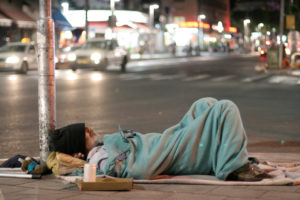 Autistic adults may be over-represented among the homeless population, according to new research published in the journal Autism. This is the first peer-reviewed study to analyze the link between autism and homelessness.
Autistic adults may be over-represented among the homeless population, according to new research published in the journal Autism. This is the first peer-reviewed study to analyze the link between autism and homelessness.
Higher Rates of Autism Among the Homeless
The study reviewed the caseload of a United Kingdom homeless outreach team. Researchers analyzed data on 106 homeless adults.
Researchers used semi-structured, in-depth interviews. These were based on the 5th edition of the Diagnostic and Statistical Manual of Mental Disorders (DSM-5). The analysis also tested for inter-rater reliability, a measure of whether two different raters will arrive at similar conclusions.
Researchers found that 13 people (12.3% of the sample) met DSM-5 criteria for an autism diagnosis. By comparison, the prevalence rate for autism is 1% in the general population.
An additional nine people (8.5% of the sample) showed several autistic traits. Yet these nine did not fully meet diagnostic criteria. People with autistic traits tended to be more isolated than those without. They were also less likely to abuse alcohol and drugs.
This elevated prevalence suggests autism could be a risk factor for homelessness. The data also suggest autistic homeless people may have worse outcomes. But the research is preliminary, and the sample is small. More research is necessary to conclusively demonstrate a link between autism and homelessness.
Autistic Adults Face a Lack of Support, Resources
The transition to adulthood can be difficult for some autistic people. Schools are generally required to provide resources to autistic children. Yet adults may have access to fewer forms of support.
The United States spends $400 million on autism research each year. Yet almost all the funding goes to genetic testing and early diagnostic screenings. Little research on appropriate support for autistic adults is available.
Many advocates argue this delegation of funds is a form of discrimination that stigmatizes autism. They say that the focus must shift to acceptance of autism instead of searching for a cure. Autism acceptance prioritizes helping autistic people thrive over preventing autism from occurring.
Therapy can help both children and adults prepare for careers and happy lives. The right therapist can be a strong ally who empowers people to advocate for themselves. They may also help people see autism not as an impediment but as a unique lens through which to view the world.
References:
- Carpenter, S. (2015, March 23). For adults with autism, a lack of support when they need it most. Washington Post. Retrieved from https://www.washingtonpost.com/national/health-science/for-adults-with-autism-a-lack-of-support-when-they-need-it-most/2015/03/23/cd082c64-b396-11e4-854b-a38d13486ba1_story.html?utm_term=.40484a2ee7e3
- Churchard, A., Ryder, M., Greenhill, A., & Mandy, W. (2018). The prevalence of autistic traits in a homeless population. Autism. Retrieved from http://journals.sagepub.com/doi/10.1177/1362361318768484
- First significant study on autism and homelessness. (2018, June 13). EurekAlert. Retrieved from https://www.eurekalert.org/pub_releases/2018-06/s-fss061318.php
© Copyright 2018 GoodTherapy.org. All rights reserved.
The preceding article was solely written by the author named above. Any views and opinions expressed are not necessarily shared by GoodTherapy.org. Questions or concerns about the preceding article can be directed to the author or posted as a comment below.

 3 Things People with Autism Wish You Would Stop Doing
3 Things People with Autism Wish You Would Stop Doing Creating a Calmer Home for Your Child on the Autism Spectrum
Creating a Calmer Home for Your Child on the Autism Spectrum How Autism Spectrum Parents Can Benefit from Couples Counseling
How Autism Spectrum Parents Can Benefit from Couples Counseling